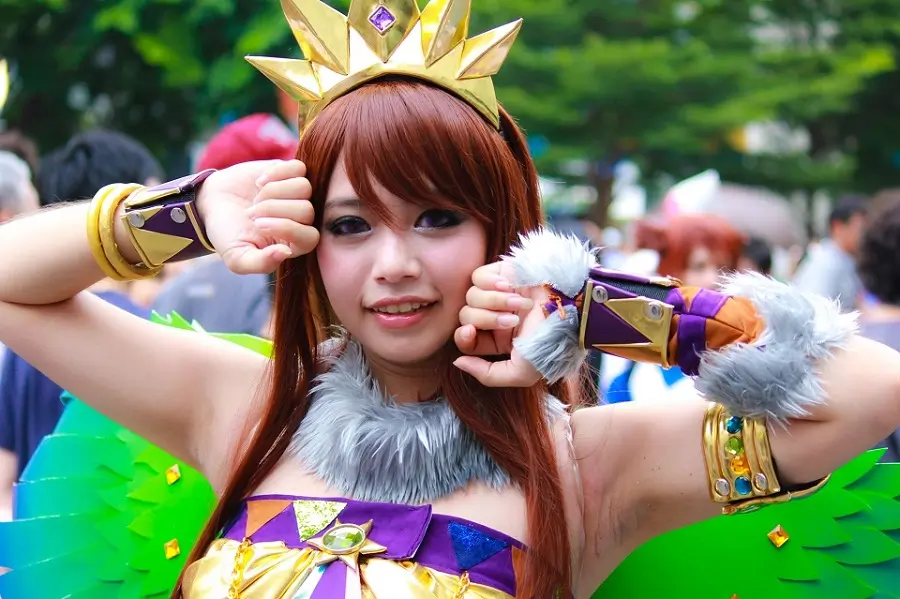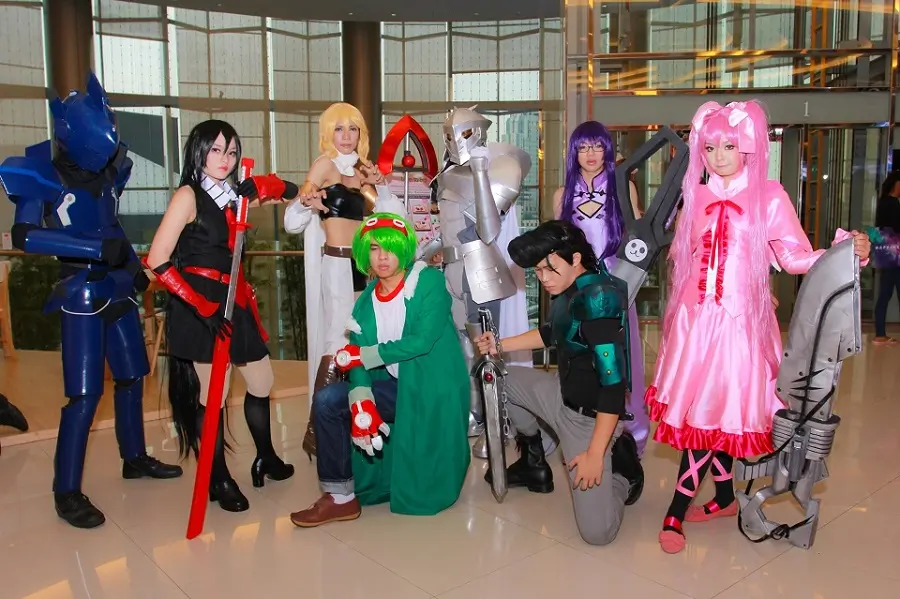Otaku Culture: Influences and Impact on Japanese Society and Beyond

Otaku culture refers to a dedicated and enthusiastic following of various aspects of Japanese pop culture, primarily focused on anime, manga, video games, and related media. It characterizes individuals deeply invested in these hobbies, often with extensive knowledge and collections.
Japan has been a hotspot for cultural phenomena that transcend geographic and linguistic barriers. The Otaku culture is among the most influential phenomena to cross these barriers.
Otaku” was initially a term used in a somewhat negative way. It was used for people who were overly interested in manga, anime, and other forms of media. Over time, the term “Otaku” has changed. It is now used more broadly to celebrate people who are passionate fans of various hobbies and interests.
The exciting Otaku culture gives us a deep understanding of Japanese style, social rules, and economy. It has also greatly influenced cultures around the world.
This article aims to delve into the origin of Otaku culture, its development, social perceptions, and global impacts. Moreover, it will also highlight its inherent power in shaping contemporary Japanese identity and beyond.
Origins of Otaku Culture
The term ‘otaku’ has a complex history. The term otaku, which originates from a polite second-person pronoun in Japanese, initially had a derogatory use.
In the past, Japanese people used the term Otaku to refer to individuals perceived as antisocial due to their extreme interest in niche subjects, particularly anime, manga, and video games.
The birth of Otaku culture can be traced back to the 1970s and 1980s, paralleling the rise of manga and anime in Japan.
Some scholars attribute the rise of otaku culture to the so-called ‘media mix’ strategy of Japanese animation studios and manga publishers.
Companies such as Bandai and Toei started to produce and cross-promote content across different media forms. These media types were TV shows, movies, products, and comic books. They were created for and encouraged a group of fans who could never get enough of their favorite series.
Critical Milestone and Subsequent Evolution
A critical milestone in otaku history is the release of the anime series ‘Mobile Suit Gundam‘ in 1979. Although it was not immediately successful, ‘Gundam’ found a cult following among hardcore fans who appreciated its detailed mecha designs and complex storytelling. This fanbase laid the groundwork for what would become known as ‘otaku.’
However, the evolution of the otaku culture has been marked by stigma. The term took on a more negative meaning in the late 1980s.
This negative perception was because of the high-profile criminal cases involving otaku individuals, most notably the “Otaku Murderer” Tsutomu Miyazaki. The media’s portrayal of otaku as socially inept and potentially dangerous further entrenched the stereotypes.
However, in the late 1990s and early 2000s, the otaku image began to shift with the global rise of Japanese popular culture. Thanks to the international success of anime series like ‘Dragon Ball’, ‘Sailor Moon’, ‘Pokemon,’ and ‘Naruto.’
As these anime series became successful internationally, the concept of ‘otaku’ started to take on a more positive, or at least neutral, meaning outside of Japan.
Today, while some negative stereotypes still persist, otaku culture has become an accepted and significant part of the global pop culture landscape.
Now, people often use the term Otaku to signify a passionate fan, not just of anime and manga. Moreover, this term represents passionate fans of not just Anime or Manga but any specialized interest or hobby, signifying Otaku culture’s evolution over time.”
Societal Perceptions of Otaku in Japan


In Japan, societal perceptions of Otaku have been multifaceted and subject to change over time. In the early years, society often stereotyped Otaku as an introverted and obsessive individual.
During those times, an Otaku was someone who preferred the fantasy world of anime and manga over real-world interactions. They were seen as people unable to engage in ‘normal’ social relationships, who instead found solace and belonging in the virtual worlds of their interest.
As mentioned earlier, the late 1980s marked a dark period for Otaku perception because of criminal cases linked to Otaku individuals. The 1991 anime film ‘Otaku no Video‘ further perpetuated this negative image. While intended as a parody, this film reinforced many stereotypes about the Otaku lifestyle.
Despite these challenges, the image of Otaku in Japan began to shift gradually from the late 1990s onward. A new Otaku generation, often called ‘light Otaku,’ has emerged. Unlike their predecessors, they are not defined by their obsession with anime, manga, or games but by their casual media consumption.
Otaku Subcategories: Manga, Anime, Cosplay, Gaming, etc.
People often see Otaku culture as a single entity. But in reality, it’s made up of many different subcultures. These subcultures are based on various interests and hobbies. These subcategories demonstrate the wide scope and varied nature of Otaku culture.
Anime and Manga Otaku:
This is perhaps the most recognized category of Otaku. These individuals are passionate fans of Japanese animated series (anime) and comics (manga). They often collect related merchandise, attend anime conventions, and participate in fun activities like creating fan art or fan fiction.
Many popular and influential anime series, such as ‘Neon Genesis Evangelion‘, ‘Attack on Titan’, and ‘One Piece’, owe their success to Otaku audiences.
These series often feature complex narratives, well-developed characters, and high-quality animation that appeal to Otaku sensibilities. Furthermore, these shows often inspire vast amounts of fan-made content, from fan art and fiction to full-fledged doujinshi (self-published manga).
Similarly, Otaku culture highly influenced the manga industry in Japan. There are genres like ‘shōnen’, which is for young boys. Then there’s ‘seinen’ for adult men. These genres have exciting stories and detailed art that Otaku like. Notable examples include ‘Naruto,’ ‘Berserk’, and ‘JoJo’s Bizarre Adventure.’
Game Otaku:
Also known as ‘gamers,’ these Otaku are devoted to video games, particularly those developed in Japan. Some famous examples are the ‘Final Fantasy’ or the ‘Pokémon’ series. We can further divide this category into various subgenres based on game types, such as RPGs, fighting games, visual novels, etc.
Cosplay Otaku:


Cosplay, a portmanteau of ‘costume’ and ‘play,’ involves fans dressing up as their favorite characters from anime, manga, video games, or other media. Cosplayers often gather at conventions to showcase their intricate costumes and connect with other fans.
The art of cosplay, popularized by Otaku culture, has gained international recognition. Events like the World Cosplay Summit in Nagoya, Japan, show the influence of Otaku culture. It attracts participants from all over the world.
Idol Otaku:
Known in Japan as ‘Idol Otaku’ or ‘wota,’ these fans are enthusiastic followers of Japanese pop idol groups like AKB48 or Nogizaka46. Their fandom activities can range from attending live performances to collecting merchandise and participating in meet-and-greet events.
Train Otaku:
Known as ‘densha otaku,’ these individuals are obsessed with trains. They collect model trains, take trips specifically to ride certain train lines, and some even memorize detailed train schedules and facts.
Military Otaku:
These Otaku are deeply interested in military hardware, history, and strategy. They often enjoy military-themed games, anime, and manga and may also collect related merchandise.
The above examples reflect the diversity within Otaku culture. Each of these subcultures has its own unique characteristics, customs, and communities, contributing to the rich tapestry of Otaku culture as a whole.
Examples of Otaku Culture Influence
Otaku culture has played an integral role in shaping Japanese popular culture and has left its mark on various forms of media and events. Here are some famous examples of its influence:
Commercial Events and Conventions:
Otaku culture has given rise to numerous conventions, both in Japan and around the world.
Events like Comiket in Tokyo, one of the world’s largest self-published comic book fairs, Anime Expo in Los Angeles, the largest anime and manga convention in North America, and Japan Expo in France are direct results of Otaku culture’s influence.
These events serve as major platforms for fans to connect, share their work, and celebrate their fandom.
Akihabara District:
Tokyo’s Akihabara district, often called ‘Akiba,’ is a testament to the influence of Otaku culture.
Known as the ‘mecca’ of Otaku, Akihabara is famous for its vast stores selling anime, manga, video games, electronics, and other Otaku-related goods. The district has become a significant tourist attraction, drawing Otaku from around the globe.
These examples reflect just a fraction of how Otaku culture has shaped media, events, and even cityscapes. Its impact extends beyond these domains, influencing fashion, language, and societal norms.
The Economic Impact of Otaku Culture in Japan
The Otaku culture, with its intense dedication to various forms of media and hobbies, has had a substantial economic impact on Japan, as mentioned below:
Direct Consumption:
Otaku are well-known for consuming related products, from purchasing DVDs, manga volumes, and video games to spending on merchandise such as figurines, clothing, and other collectibles. This consumption fuels a significant portion of the Japanese entertainment industry.
Tourism:
Areas like Akihabara in Tokyo, known as an ‘Otaku Mecca’, attract tourists worldwide, contributing to Japan’s tourism industry. Anime and manga-related tourism, often referred to as ‘contents tourism’, has been recognized by the Japanese government as a significant economic driver.
As mentioned earlier, Otaku-oriented conventions such as Comiket generate substantial revenue. Not only do they sell tickets for entry, but they also stimulate the economy through vendor sales, lodging, travel, and other related expenses.
The ‘Cool Japan’ Initiative:
Recognizing the global popularity of Japanese pop culture, the Japanese government launched the ‘Cool Japan’ initiative in the early 2010s to capitalize on the export of Japanese cultural products, from anime and manga to fashion and food.
Otaku culture plays a significant role in this strategy, promoting Japanese culture abroad and generating export revenues.
Digital Economy:
With the rise of the digital age, Otaku culture has also made its mark on the online economy. The Otaku culture contributes to Japan’s growing digital economy, from digital content purchases and subscriptions to streaming services to online gaming and virtual reality experiences.
While it is challenging to quantify the exact economic value of Otaku culture due to its wide-reaching influence, it is clear that its impact on the Japanese economy is substantial.
Furthermore, as the influence of Otaku culture continues to grow internationally, its economic impact is expected to expand even further.
Global Influence and Perception of Otaku Culture


The global influence of Otaku culture has grown significantly over the past few decades, driven largely by the international popularity of anime and manga. However, the perception of Otaku outside Japan differs in some ways from its domestic perception. Let us dive deeper into this as follows:
The popularity of Anime and Manga:
Japanese anime and manga have fans all over the world. Popular series like ‘Naruto‘, ‘Dragon Ball‘, ‘One Piece‘, and ‘Attack on Titan‘ have been translated into multiple languages and aired in dozens of countries.
These shows and books have introduced millions of people to Otaku culture and created international fan communities.
Global Perception of Otaku:
While the term ‘Otaku’ carries a degree of stigma in Japan due to its association with obsessive fandom, the label is often embraced by international fans of Japanese pop culture.
In many contexts outside of Japan, being an ‘Otaku’ means being a fan of anime and manga and lacks the negative connotations it has domestically.
Economic Impact:
Otaku culture has also made a significant economic impact on markets outside of Japan.
The global anime market, for instance, was valued at over $20 billion in 2018 and continues to grow. This demonstrates not only the popularity of anime and manga but also the willingness of fans worldwide to spend money on related products.
Cultural Exchange:
Finally, Otaku culture facilitates cultural exchange, introducing people worldwide to Japanese customs, values, and societal issues. For many international fans, anime and manga are their first exposure to Japanese culture and can lead to a broader interest in Japan.
The influence of Otaku culture globally is a testament to its unique appeal and the power of its storytelling. As it continues to spread, it fosters a greater understanding and appreciation of Japanese culture worldwide.
Criticism and Controversies for Otaku Culture
While largely celebrated for its influence and diversity, Otaku culture has not escaped criticism and controversy. Inside Japan, there is a societal concern that the Otaku’s intense obsession with their interests, often at the expense of social interaction and traditional societal norms, can lead to escapism and social isolation.
Furthermore, some worry that Otaku culture excessively sexualizes female characters, reinforcing problematic gender stereotypes.
Outside of Japan, while many appreciate Otaku culture’s unique creativity and storytelling, it can also be misunderstood or stereotyped, resulting in an oversimplified view of Japanese culture as a whole.
There’s also criticism concerning cultural appropriation and lack of cultural context in foreign consumption and production of Otaku-related media.
Thus, while Otaku culture is prominent in global pop culture, it also invites important conversations about societal norms, representation, and cultural understanding.
Conclusion
In conclusion, Otaku culture, originating from Japan, has carved out a significant niche in today’s global cultural landscape.
From its roots as a term used to describe individuals with a strong interest in anime and manga, Otaku has transformed into a celebration of passionate fandom spanning various fields, including gaming, cosplay, idols, and more.
The economic impact of Otaku culture on Japan’s economy is palpable, contributing not only to the domestic economy but also to the global market. It has fostered a vibrant creative industry, boosting tourism, generating job opportunities, and promoting the export of Japanese cultural products.
However, as with any subculture, Otaku is not without its challenges and criticisms. Stereotypes and misunderstandings persist, but these have been gradually changing as the global community becomes more familiar with the diversity within Otaku culture.
Moreover, the intersection of Otaku with other subcultures, such as Kawaii culture, demonstrates its dynamic nature and capacity to evolve. As Otaku culture continues to adapt and grow, both in Japan and on the international stage, it is likely to offer even more fascinating insights into the world of pop culture and its influence on society.
In essence, Otaku culture is a testament to Japan’s unique ability to turn passion into art, turning the fandom into a celebration of creativity and niche interests.


A long-term ex-pat in Japan, Himanshu comes with an IT background in SAP consulting, IT Business Development, and then running the country operations of an IT consulting multinational. Himanshu is the co-founder and Managing Director of ReachExt K.K. and EJable.com. He is also an Advisory Board Member of a Silicon Valley AI/IoT startup.

